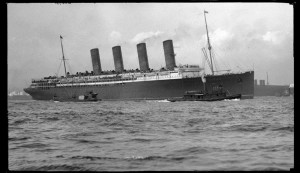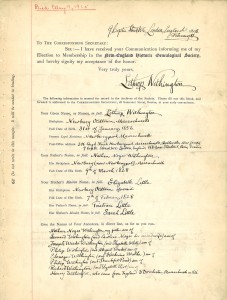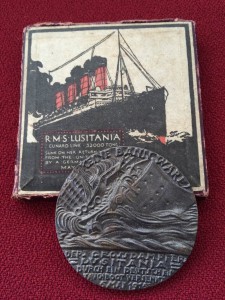
A century ago today, on 7 May 1915, the Cunard liner R.M.S. Lusitania was reaching the end of her latest transatlantic voyage. The Lusitania left New York on 1 May with 1,266 passengers and 696 crew on board, bound for Liverpool in England. While steaming eleven miles off the Old Head of Kinsale in Ireland, the vessel crossed the path of German U-boat U-20. The launch of a single torpedo into the hull of the Lusitania claimed the lives of 1,198 passengers and crew, leaving 761 survivors of an incident that lasted only eighteen minutes. Even though American lives were lost, it would be nearly two years before America entered the First World War in April 1917.

Among the Lusitania passengers lost a century ago was NEHGS member Lothrop Withington, a genealogist and historian born in Newbury, Massachusetts 31 January 1856. At NEHGS we have a few of his publications in our collection, including his contributions to Henry Fitz-Gilbert Waters’s popular Genealogical Gleanings in England, and Virginia Gleanings in England: Abstracts of 17th and 18th-Century English Wills and Administrations relating to Virginia and Virginians, which is a consolidation of Withington’s articles in The Virginia Magazine of History and Biography.
The Society has another connection with Withington and the loss of the Lusitania. The site of the NEHGS headquarters at 99–101 Newbury Street was originally two separate houses built in the late nineteenth century. The 1886 edition of The Boston Blue Book lists Boston bookseller Charles E. Lauriat (Sr.) (1842–1920) at 101 Newbury Street. Lauriat was the founder and namesake of the well-known bookstore chain, which remained in business for 127 years until it closed in 1999. Also living in the house where NEHGS now stands was Lauriat’s twelve-year-old son Charles E. Lauriat Jr. (1874–1937), who later travelled with his friend Withington on the Lusitania; he would be one of the lucky survivors in 1915.

Lauriat went on to publish his own account of the sinking in a book titled The Lusitania‘s Last Voyage (Boston: Houghton Mifflin Co., 1915). It is a strange twist that the site of Lauriat’s boyhood home would later be the home of NEHGS. A memorial to Withington’s genealogical pursuits was published in the Proceedings of The New England Historical and Genealogical Register 70 [1916]: 70: xliii.
Today I hope you will join me in remembering those who perished this day a century ago. To learn more details about the Lusitania, her passengers, and her crew, I suggest visiting http://www.rmslusitania.info/; http://www.lusitania.net/; and the Facebook group https://www.facebook.com/TheLusitaniaResource.
Lothrop Withington was my 1st cousin 3 times removed. His mother, Elizabeth Little was a sister to my g-g-grandfather, William Little and Lothrop was a 1st cousin to my great-grandfather, George Little.
I have realized Lothrop Withington is also my distant cousin. I am a descendant of George Little of Newbury, Mass. as well. I am working on a detailed article to submit to American Ancestors for later this year.
Then you would be a distant cousin of mine. My dad’s (Arthur withington) uncle David Lititle withington, did geneology of the Withington and little families. My dad is continuing some of that
One of the things I enjoy doing as the family historian is linking historical events, such as the sinking of the Lusitania, to family members. As it turns out, my grandfather took a return trip to Liverpool on the Lusitania in June 1914. This anniversary has allowed me to do a bit of research and learn more about the ship and how it would be to travel this way albeit in 3rd class.
Granted, it’s just a wee link to the Lusitania, but gives me an opportunity to bring such an historical event to the attention of my family and for all of us to wonder what our grandfather thought when he learned it had been sunk.
At the very least, including defining events, helps to put the lives of our ancestors into context. But it also reminds us of historical events that shaped our nation and the world. It must have been a very sad day (and for days thereafter) for the US and the families who lost family members and friends. It was also a fateful day when the US was slowly drawn into WWI. Two years later, when the Germans decided they could once again sink passenger ships, it was our turn to be “Over There.”
Interesting story. We had a Lusitania Commemoration week in Courtmacsherry for the last week. The first rescue lifeboat to go to the scene of the disaster was the Courtmacsherry Lifeboat. It took the crew over three hours to reach the area as they had to row the boat because there was no wind to sail it. A distant relation of mine was the cox’n of the boat. The sad reality though is that over last weekend while we were commemorating this terrible human disaster, over 6,000 Syrian and African migrants were rescued in Italian coastal waters. War and the sea still continue to claim more innocent lives than ever.
As an almost-off-topic side note to the Lusitania tragedy, I was quite struck to learn that my Norwegian grandfather, his siblings, and their mother emigrated to America in 1890 on a Cunard liner. They came steerage (3rd class), the way the vast majority of immigrants did, from whatever country. We have something of an image of Cunard as a luxury line, but from the passenger lists I’ve seen, by far the largest number of passengers on most of the early ships were in steerage. They were tightly packed into the hold, of course, not in large cabins. The length of the trip was the same for all passengers, but the comfort wasn’t. I wonder if there are numbers on how many Lusitania survivors were from steerage, as opposed to first and second class? I know that virtually no steerage passengers survived the sinking of the Titanic, but there were major differences between the two. The Lusitania went down quickly, while the Titanic took several hours to sink, for one thing.
I am amazed to think that my mother, who was eight years old in May of 1915 would be one hundred and eight now! I remember her Lusitania story which she told me when I was eight years old. Her mother, my grandmother, immigrated to Boston when she was eighteen from Karlskrona, Sweden. When my mother was seven years old my grandmother took her with her to visit her family–her older sister who was married and had eight sons. Her sister’s family now lived on a beet sugar farm outside of the city of Malmo. I do not know why, but they stayed for over a year. And my mother told me the story of how they were booked for their return trip on the Lusitania, embarking Liverpool. Of course leave-taking from the family was in Malmo, and I doubt anyone accompanied them on train and steamer to arrive in Liverpool to meet their ship only to find that it had been torpedoed and sunk.
What would or could a woman traveling alone with a child do, in 1915, at this devastating news? How would they have proceeded? They certainly weren’t alone in this predicament and I have often wondered, as an adult, what kinds of precarious situations they found themselves in as they tried to book a new passage on another ship? What fierce competition for tickets must have occurred between the stranded Lusitania passengers? Where could they board while waiting for a new passage date?
I found their return passage to New York City way into September. So, I can only deduce they were compelled to return to Malmo. (My mother never said and I didn’t think to ask.)
She concluded her story by (mistakenly) conveying to me that her father and sisters were completely surprised when the two weary travelers finally stepped up onto their own porch and knocked on the door. The family for some reason thought the two had been lost on the Lusitania when it went down.
My aunt, who was keeping house for my grandfather while mother was gone to Sweden, stuck her hand out the door to receive what she thought was their morning mail delivery. To see her long lost mother and little sister standing there waiting to come in must have been an astounding shock for her and the rest of the family! However shocked and astounded they were, all had ended happily and all went back to normal now that mother was home again. But, what an extraordinary predicament to find yourself in. What are the stories of the hundreds of others stranded by the sinking of the Lusitania?
Like several other commentators, I have family members who traveled on the Lusitania. Shortly before the outbreak of war, my great-great-grandmother and her youngest son went back to Scotland for a visit, and kept a postcard of the ship. It was rather exciting to learn that they had traveled on such a famous vessel.
A picture of the Lusitania graced a room of our family homestead in Highgate Center. Vermont. It had been the office of a lawyer who was the father of Vermont United States Senator Warren R. Austin. Senator Austin was the United States ambassador to the United Nations when the Korean conflict broke out. The picture prompted me to do some research during my preteen years about the attack on the ship. What came of it was a realization that war is indiscriminate about its victims. When will we ever learn?